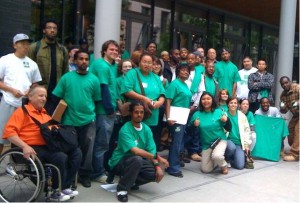
Young workers from Got Green told the Seattle City Council in 2009 to create more green jobs and education opportunities
On December 3 Got Green received a Small and Simple Projects Fund Matching Grant from the Seattle Department of Neighborhoods to launch the Young Workers in the Green Economy Project. At the heart of this endeavor is a simple idea: young adults from low-income backgrounds and communities of color should have a voice in the public policy process—particularly on issues such as youth unemployment, access to higher education, and pathways to green jobs. We recently sat down with Sintayehu Tekle, Got Green board member and head of the steering committee for the Young Workers in the Green Economy Project, to hear his vision behind this new initiative.
Got Green: What inspired you to become involved with the Young Workers in the Green Economy Project?
Sintayehu Tekle: Well, I’m a young worker myself. A couple of years ago I was unemployed, had no job, no experience. Got Green had the weatherization training. They got me in, and gave me the experience and the people to talk to. So I feel this is like kind of giving back to my community. I know people out there with the same issues that I had a couple years ago, and I wanted to make sure that they get the education, or that they can find the resources to go somewhere. Being a young worker, I know how it is—especially in this environment—it’s very hard. And I feel like a lot of people have barriers: language, education, driver’s license, legal stuff, resources—there are just many different barriers that people actually deal with in our community. I want to make sure that I reach out there and say, look, if I can do it, we can do it together. If somebody can help me, I want to help you, too. I want to open more doors for other people as well. That’s why I feel so passionate about this project. It’s like, whoa! It hit home.
GG: What outcomes do you hope to achieve through this project?
ST: People aren’t going to be part of something they don’t feel love for, or don’t have passion for. I want to get that aspect from everybody on the committee first. The result that we want, really, is just talking. Just getting people to talk, seeing what issues we young workers deal with. Why aren’t we included in the job sector in our own community? What are the barriers that people are actually facing to not go out and be able to get a job. It’s just about finding out about people’s barriers. Once we find out what’s going on with the survey, then we do the action, the footwork. Anything that Got Green touches actually turns to gold. I mean it. But not like you’re thinking…it’s the people in the community that are actually doing this thing.
GG: Is there a message you want to send out to folks about this project?
ST: People in the community know what we bring, so we have to bring it. We’re here to succeed. I think it’s important for people to know that this is a full commitment. We’re not in it just for part time. It’s a two-year project. There won’t be results right away. It isn’t like, “Do this and you’ll get a job.” We have to do the footwork before we get the results. But we’re in this. You can’t expect things to change by just sitting there. This is going to be the whole nine. This is something everybody is going to be committed to do the whole way. I know when I first came in I was like, this is going to be just another training, but this thing actually made me a believer. I’m in an apprenticeship now. If you asked me three years ago if I would be in this position, I would say no. I want to open doors to let people know that there are different avenues to take. You just got to make sure that you stay committed.
–by Mike DeGive. Mike DG is interning at Got Green as part of his masters degree at the UW School of Social Work. He looks forward to volunteering on the Young Workers Project
